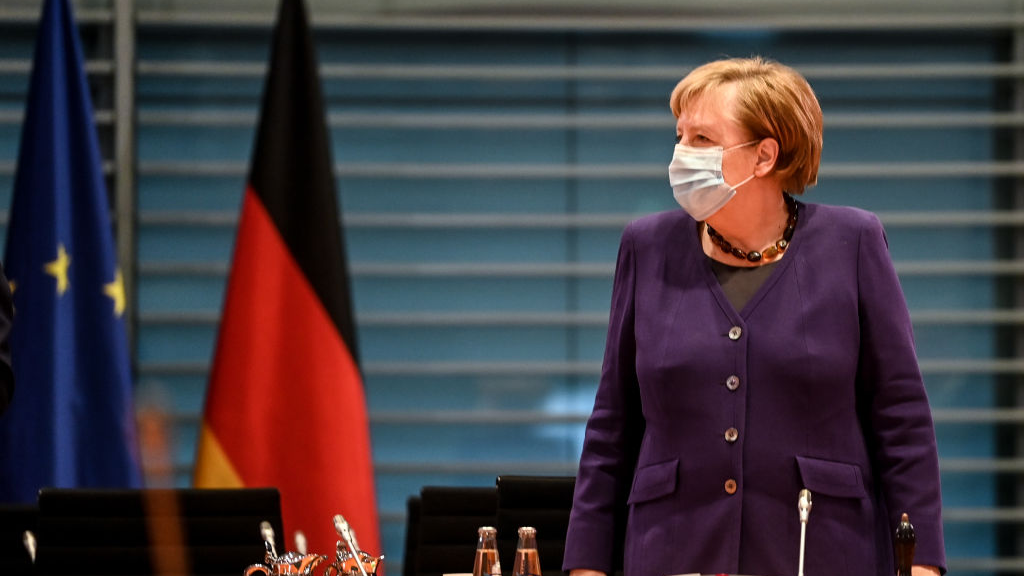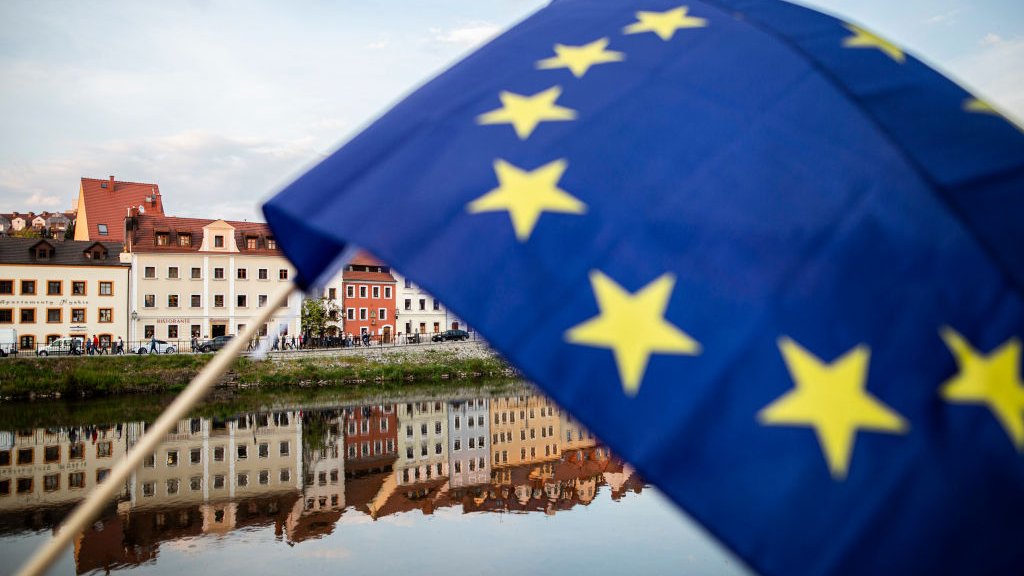
German Chancellor Angela Merkel wears a face mask as she attends the weekly meeting of the German Federal cabinet in the conference hall of the Chancellery in Berlin, Germany, December 2, 2020. /Getty
German Chancellor Angela Merkel wears a face mask as she attends the weekly meeting of the German Federal cabinet in the conference hall of the Chancellery in Berlin, Germany, December 2, 2020. /Getty
Editor's note: Freddie Reidy is a freelance writer based in London. He studied history and history of art at the University of Kent, Canterbury, specializing in Russian history and international politics. The article reflects the author's opinions, and not necessarily the views of CGTN.
This week's European Summit marks the final chapter of Germany's six-month presidency of the European Union. The summit is supposed to be the occasion where the bloc passes its landmark 1.8 trillion euro ($2.2 trillion) multi-annual framework (MFF) budget, as it also looks to set the region's ambitious climate objectives. However, Poland and Hungary have signaled their displeasure at the conditions of the MFF and as such, Merkel's political apotheosis is on ice.
While the EU has faced many challenges in its existence, Brexit and COVID-19 have arguably been the most challenging. Not due to their short-term impact but to the longer-term threat to the bloc's stability.
The pandemic saw a rapid return of unilateral action by member states over borders, medicines, and economic relief. It became apparent to some, that such a reversion must be controlled quickly to prevent a temporary measure becoming a norm and spilling over into other policy areas.
It was somewhat inevitable therefore, that the MFF contained a "rule of law" clause, binding economic relief to a political commitment to EU standards on domestic policy.
Poland and Hungary see this as a Brussels "mission creep" and unlike many other European leaders, they have not shied from openly criticizing the EU. Polish PM Mateusz Morawiecki told reporters that the bloc was in danger of becoming an "oligarchy" and attempts to tie economic measures to political "rule of law" policies risked the bloc's "collapse."
The Polish right-wing magazine Do Rzecy also ran the headline "We Must Tell the EU: Enough – Polexit – We Have a Right to Talk About it." While such statements do not represent mainstream thinking, with over 80 percent of Poles wishing to remain within the European Union, it does speak to a wider concern among some nations over the way in which the EU chooses to act.

Protesters wave a European Union flag during a demonstration against the closed German-Polish border in Goerlitz, Germany, April 24, 2020. /Getty
Protesters wave a European Union flag during a demonstration against the closed German-Polish border in Goerlitz, Germany, April 24, 2020. /Getty
Portugal is another nation said to be concerned by the insertion of the "rule of law" clause. One of the principal concerns is that the amendment is not underpinned by a treaty and such could be viewed as something of a Trojan Horse.
Unlike Brexit, many of the concerns of Poland have a greater social dimension, than economic. Poland has a distinct Christian ethos to its legal system and EU rules around LGBTQ rights are the cause of much of the opposition.
While the EU is striving to soften some language around the "rule of law" clause, the threat of a veto will have seriously unsettled Chancellor Merkel, who cannot allow a precedent to be formed where member states hold EU initiatives hostage.
While the Chancellor is known to always seek to "keep everyone on board," contingencies are being made for the EU to sidestep Polish or Hungarian vetoes and press ahead with the MFF.
Such a move is highly undesirable but is not without its own precedent. Herein lies a Brexit parallel. In 2011, the United Kingdom vetoed the EU treaty amendment which proposed massive economic aid in the wake of the Credit Crunch, at a time when the UK was denied treaty amends of their own. In that instance, the EU bypassed the UK veto and pressed ahead, marking a significant event in the buildup to the UK's withdrawal from the European Union.
On reviewing these events, former French President Nicolas Sarkozy remarked that "There are two things in Europe you shouldn't do; isolate yourself, and try to force things through." Poland and Hungary are playing a high stakes game and while the EU is reliant on consensus, it has shown before that it is not bound by it. As such, serious consideration will need to be given to the political merit of making a stand on the issue.
What is likely, is that Poland and Hungary will settle for a softening of the language. However, it would appear there is a great deal of sympathy for the Polish PM's observation that "Europe is great when it is a Europe of homelands," a collection of individual nations and cultures with their own specific needs, rather than a homogenous bloc.
The division of southern European nations and the "Frugal Four" has already been exposed in the EU's economic response, but Chancellor Merkel will not wish to hand over the Germany presidency of the EU with signs of greater fraction than before.
As Merkel's own time as chancellor approaches its conclusion, the pragmatic European matriarch will be keen to secure the EU's economic future as well as conclude the UK's trade agreement this week. What is certain though, is that this urgency to close a deal will be exploited, and likely result in the compromise for which the Chancellor is famed.
(If you want to contribute and have specific expertise, please contact us at opinions@cgtn.com.)

